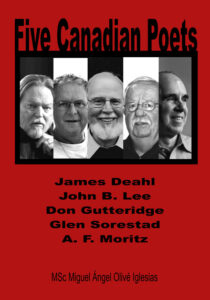Author: Miguel Ángel Olivé Iglesias
Title: Five Canadian Poets:
Analytical Essays on, James Deahl, John B. Lee, Don Gutteridge, Glen Sorestad, A. F. Moritz
ISBN: 978-1-989786-36-9 = 9781989786369 – Soft cover
Trade Paperback: 308 pages – 7 X 10
Suggested Retail (Paperback): $26.95
Genre: Canadian Poetry; Analytical Essays
E-Stores: Amazon, Barnes & Nobel, Indigo and other e-stores worldwide.
Be sure to check each e-store for the best price on book and shipping as prices tend to vary a lot from e-store to e-store
Local Store: Contact your local bookstore. They will order the book for you – direct them to Hidden Brook Press with the title and ISBN.
Free Reviewer Copy: If you are going to publish a review in a Newspaper or Magazine we will send you a free copy. If you are going to publish a review on your Website or Blog we can offer you a copy at 50% discount.
An Introduction with a Few Words on Miguel Ángel Olivé Iglesias’ Five Canadian Poets. Analytical Essays on James Deahl, John B. Lee, Don Gutteridge, Glen Sorestad and Al Moritz, QuodSermo Publishing, 2021
Write what you know. Write what you love, what you care about. Someone, somewhere, at one time or another, wrote these words down because they made perfectly good sense—plain, good advice written in plain, simple words. For me, nothing could be more obvious, although I suppose a post-modernist might argue that one should write to reveal to oneself what one may or may not know, to uncover what’s buried under layers of noisy obfuscation and obscurity, peel back the curtain on the subconscious, on the unknown. I suppose. Fortunately, for this reader, Iglesias writes about what he cares—and what he cares about is Canadian poetry as revealed in the work of five poets, five gems, as he calls them, dear to his soul.
The task of many literary critics or reviewers is to serve as a guide, and in the process identify the standards against which a work is judged, evaluated and described. A review can be forensic in nature, the subject—either poem or poet—closely examined, picked apart and analyzed to determine how well its organs are functioning and whether the body of work merits being re-assembled for further attention. It can be a delicate operation, dissection always is, and bodies are often lost on the slab. But some critics are content to appreciate and admire the subject in question and let their own words serve as a conduit for presenting the work to the world. Iglesias, in these reviews, is such a critic, inclined to appreciate rather than deliver a forensic verdict on the state of the poetry. Not that he avoids the temptation to analyze and make sense of an image, or highlight the music in a line of verse, or praise a powerful insight. He revels in that sort of thing, but he does it with complete admiration at the wonder of poetry produced by these “five gems” of the Canadian canon.
Iglesias is gaga over these gems. It is obvious from this book and his many other pieces on Canadian poets and poetry, that he is passionate about poems crafted north of the 49th, poems about the boreal wilds of Canada and its broad, uninterrupted landscapes; poems forged in busy, bustling cities and in quiet, sleepy rooms where even there nature seeps in and controls the metaphor. He reads closely, reads with an eye to engage and embrace, make sense of a country that as a Cuban he has never visited, a people he has only ever met face to face on his own island, away from home. It is a testament to his courage as a reader and critic that he can delve so deeply into these foreign poems and revel in their foreign beauty with such determination and clarity.
If you are unfamiliar with these five poets, be prepared to be introduced to work as diverse and as varied as the country is wide. Iglesias takes the time to carefully polish several individual poems by each of these poets and coax from them that inner gleam and subtle brilliance that he deems gem-like. The image may be over-stated. But you will find that Iglesias’ patience and precision with each of these poets is not far from that of a gemologist with a loupe in one hand and a pencil in the other making careful notations of every facet, admiring how the light within is refracted into a spectrum of possibilities.
James Deahl, John B. Lee, Don Gutteridge, Glen Sorestad, and Al Moritz, five gems of Canadian poetry that Iglesias values and appraises, five gems that merit being praised, if nothing else, for a lifetime of devotion to poetry. Iglesias, however, does more than that. He recognizes the uniqueness of their voices, the way they work and ply the broken line, the themes that surface and re-surface to give their poetry a patina in which Iglesias sees himself reflected. In the end, you will notice that there is a sixth gem in this collection, that of the critic who is, although self-effacing and non-intrusive, prominent as a beacon for the reader heading for the shores of Canadian poetry.
Antony Di Nardo



